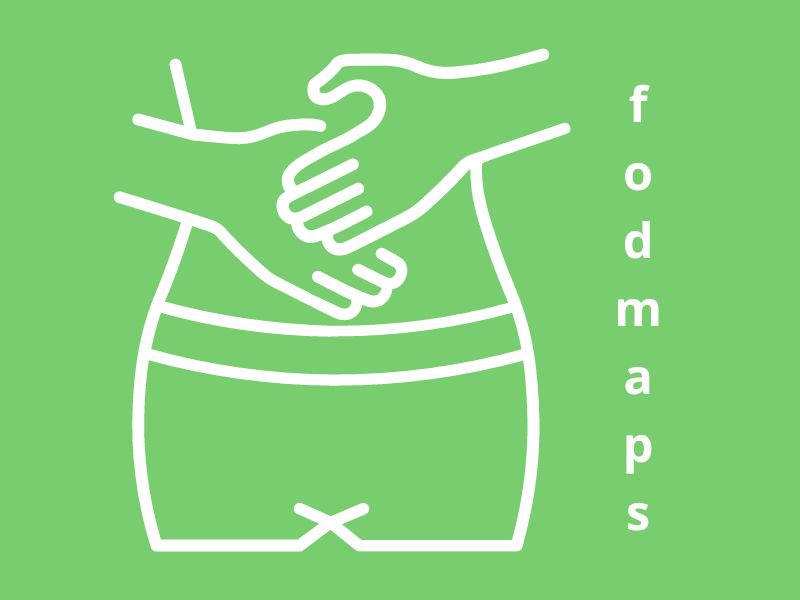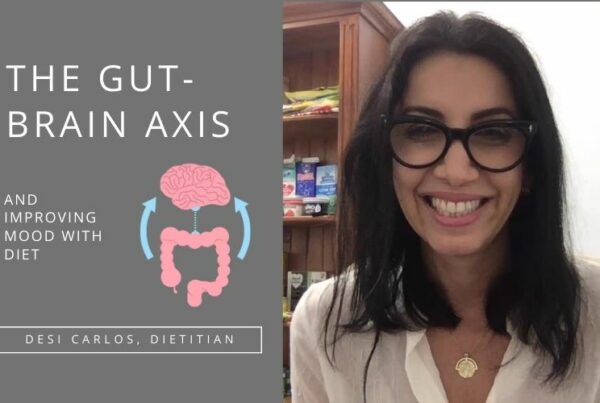FODMAP Dietitian
Are you tired of being reactive to food? Of always needing to worry about where the toilet is? Or waking up not knowing whether today is going to be a good or bad day for IBS? Or maybe you’ve been told to follow a low FOMAP diet, but you’re not sure where to start, or even if it’s the right fit? As a renowned gut health, IBS and FODMAP dietitian since 1993, Desi Carlos has supported thousands of people experiencing the whole spectrum of IBS/FODMAP intolerance symptoms. From uncomfortable and annoying, to downright devastating.
Whether you’re brand new to IBS or the FODMAP diet, or it’s been ruling your life for a while, Desi and her team of passionate gut and FODMAP dietitians support you to find a better way. It’s a gut-health-first approach, using a proprietary evidence-based protocol developed by Desi through years as a gastrointestinal nutrition specialist.
But first things first…let’s look at what the key symptoms are, as well as what FODMAPs are, and why they might be causing you so many problems.
FODMAP intolerance symptoms

FODMAPs explained
FODMAP is short for Fermentable Oligosaccharides Disaccharides Monosaccharides and Polyols. What are mouthful right, so what exactly are they? FODMAPs are short-chain carbohydrates (sugars) which exist in some foods, both natural and processed. These sugars resist digestion, and can reach your lower intestine, where your gut bacteria uses them for fuel. In some people, this can trigger symptoms of irritable bowel syndrome. Examples of FODMAPs:
- fructose (fruit and sugar)
- lactose (found in milk)
- fructans (grains)
- galactans (legumes)
- polyols (sugar alcohol found in some sweeteners)
How does a low FODMAP diet work?
Most of the research on FODMAPs has actually been done in Australia by Monash University. They have developed a standardised FODMAPs dietary protocol which has been tested and trialled. This forms the diet that we use as Monash University FODMAPs accredited and trained specialists. The diet involves extensive elimination of FODMAPs, and reintroduction under supervision with a FODMAP dietitian. The diet forms three stages:
- Elimination phase. Removing all FODMAP foods for 2 -4 weeks
- Challenge phase. Single reintroduction of FODMAP foods
- Reintroduction phase. Reintroducing previously challenged foods that passed.
The aim of the FODMAP diet is to determine which specific foods are triggering symptoms, rather than eliminating FODMAPs altogether if possible.
Why do FODMAPs cause IBS?
Not all people experience bowel issues from FODMAPs, but for some, they can trigger IBS. When FODMAPs reach the large intestine, your gut bacteria (microbiota) use them as fuel to ferment. The fermentation process produces gas. This happens for everyone, usually without any issue. However, in some people, the volume of water and/or type of gas can cause problems. There are a few reasons pain and discomfort such as distension, wind and bowel changes might occur:
- An extremely sensitive gut wall;
- Food moving slower than normal through the intestines, attracting more water and gas;
- A different makeup of bacteria in the colon, which produces a different gas (hydrogen) rather than the usual methane gas;
- A general gut microbiome imbalance where bad bacteria outweighs the good
Uncomfortable, painful and embarrassing symptoms can appear within 4 hours of eating. As a FODMAP dietitian, experience shows the symptoms are most often unrelated to the type of food eaten in the most recent meal, and more related to a meal eaten 1-2 days earlier. This can make it quite challenging to understand just what is triggering your IBS on your own.
Can anyone follow a low-FODMAPs diet?
A low-FODMAPs diet should not be followed long-term, and we recommend you only undergo elimination and challenge with dietary supervision. Our recommendation for a low-FODMAPs elimination diet is a maximum of four weeks.
Sadly, we’ve met people over the years who have started the diet (usually without an experienced FODMAP dietitian) and found they reacted to a high number of FODMAPs foods. While removing the foods may have relieved some symptoms, it can often see people stuck on the elimination-style phase for years. The problem is, a very restrictive diet removes so many foods, we can end up deficient in key nutrients. The deficiency can even make symptoms (and sensitivity) worse. Suddenly, you’re reacting to more and more things at the drop of a hat, and life looks and feels, far from normal.
A low-FODMAPs diet is an effective and evidence-based tool for uncovering true food intolerance. However, it is only intended to be used as a tool. It is important that we don’t see this diet as a permanent solution to irritable bowel or other gut issues.
If eliminating FODMAPs has seen symptoms improve, you may be hesitant to “rock the boat” with the challenge phase. If that’s you and you’re stuck halfway through the process, we encourage you to get the professional support you need to progress.
Is it really FODMAPs causing your IBS?
While FODMAPs are often presented as the first port of call when it comes to finding the cause of irritable bowel syndrome, we don’t believe this should be the case. This can even be passed on by well-meaning professionals. Our experience shows that hidden behind a sensitivity to foods, can often be an unhealthy gut microbiome, or other gut-related conditions. These issues can often make FODMAP sensitivity worse.
We like to think of our health a little bit like a garden, and our gut microbiome is the soil. If our soil is rich in key nutrients, then good bacteria outweigh the bad. This good soil produces plants that thrive and are resistant to pests and disease. If our soil has been depleted, then it won’t contain those key bacteria. Anything we plant does not thrive. And what’s more, the plants can be less hardy, and more prone to disease. Our microbiome is much like this. If the bad bacteria outweighs the good, we fail to thrive too.
Just as removing any visible bugs on the plant will help it in the short term, removing FODMAPs can ease symptoms. But if it’s the soil (microbiome) that needs fixing, that’s always the best way to ensure long term health.
So maybe FODMAPs isn’t your first option for IBS. That’s why it’s a great idea to speak to us before you start any low-FODMAP diet. The Tree of Life Nutrition gut protocol may be the more appropriate first step in understanding the underlying causes of your IBS.

A gut health-first approach
At Tree of Life Nutrition, we rule out gut dysbiosis and other gut-related conditions first, before proceeding with a FODMAPs diet. This gut-health first approach helps to increase numbers of healthy gut microbiota, and repair the lining of the gut. In some cases, a robust gut protocol is all that is needed to address IBS symptoms. For others, a true intolerance is still indicated.
We then supervise and support you to undergo a FODMAPs diet to determine which foods are causing your symptoms. Our goal is to guide patients through it safely to ensure high quality nutrition intake is still being achieved, despite the restriction. Due to the healthier microbiome, the FODMAPs process is usually much shorter and the extent of sensitivities may not be so severe.
Why guided support from a FODMAP dietitian is always best
Supervised support for FODMAPs is always the best approach in order to:
- Help make the process easier. We offer you support to navigate eating out, meal modification, family meals, shopping and cooking.
- Maintain high quality, balanced nutrient intake. Nutritional deficiencies can exacerbate symptoms. We don’t just tell you what to cut out, we guide you on what to include to ensure you are still sufficiently fueled.
- Move through each phase quickly and effectively. What we don’t want to do is see you stuck on the elimination diet. We offer step by step guidance – we don’t just send you away and let you run free with it. We have a lot of experience and understand the frustration and barriers patient’s face during this process.
- Understand and manage symptoms. Supporting you through the challenge phases, offering our experience and resources for managing flare-ups and identifying important indicators of FODMAP intolerance. Your questions can be answered, any time.
- Maintain commitment. Any restrictive diet takes a lot of commitment, and support is invaluable to helping you stick with it for the required time without the overwhelm!
- Offer you a long term solution after the diet is over. We offer our nutritional knowledge to provide you with solutions that meet your dietary needs over the long term.
Are you stuck on a low-FODMAPS diet?
As we’ve mentioned, a low-FODMAPs diet is not advised as a permanent diet. If you have been on the elimination diet for longer than four weeks, the diversity of the gut microbiome and level of inflammation in the body can be affected. If you’ve been eating this way long term, it’s probably time to seek the support you need to get back into balance. Desi is an experienced FODMAP dietitian who is passionate about helping reignite a healthy, vibrant life and a fun and easy relationship with food. Desi and the team may even be able to help you recover some of the foods you thought were lost and remove the restrictions which might see you missing out on important nutrients.
If you’re hoping to reassess your low-FODMAPs diet, we focus on gut repair, and getting to the root cause of symptoms, before challenging again under our support and supervision.
What is the next step?
Book an appointment with one of our dietitians. We start with addressing your overall health, and gut health generally, before focusing on whether FODMAPs is right for you.
Read some of our articles about gut health and IBS



